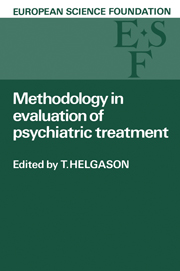 Methodology in Evaluation of Psychiatric Treatment
Methodology in Evaluation of Psychiatric Treatment from INTRODUCTION
Introduction
Evaluation at its best is a systematic way of learning from experience and using the lessons learned to improve both current and future action. At its worst, it is an activity used to justify the selection of a scapegoat for past failures.
There are several ways of increasing the probability that evaluation will be useful and not destructive. These include:
(a) making evaluation a continuing process rather than an isolated, short-lasting activity;
(b) ensuring that those who are responsible for the work in question actively participate in its evaluation;
(c) evaluating both quality and quantity of performance and using indicators in which this dual approach will be included (e.g. the number of home visits which were useful and were seen as such by those visited and those visiting);
(d) validating information which will be used in evaluations; and
(e) expressing the results of evaluation in a language which can be understood by those involved in aprogramme and ensuring that the results are seen as valid by all involved (or, alternatively, that the reasons and nature of disagreements are noted).
Specific issues ln evaluatlon of mental health care
Principles governing the evaluation of health services in general all apply to the evaluation of mental health services. In addition, however, there are certain specific features of mental health problems which require additional attention. These include the following:
Only a minor proportion of all those with mental disorders are treated in mental health services, out of which two groups can be distinguished: the first spends only a small proportion of the total time of illness in contact with the facility; the second spends most of the total time of illness - and life - in the facility.
Much of mental morbidity is handled outside the mental health services either at primary care level by general practitioners, community nurses, etc., or by specialists of other disciplines (e.g. internists, paediatricians, geriatricians).’ The role of school medical services, occupational health services and prison medical services may also be considerable in providing mental health care. This implies the need for a broad data base in evaluating mental health care to identify both what is being done by services outside specialized mental health services and what is not being done.
To save this book to your Kindle, first ensure [email protected] is added to your Approved Personal Document E-mail List under your Personal Document Settings on the Manage Your Content and Devices page of your Amazon account. Then enter the ‘name’ part of your Kindle email address below. Find out more about saving to your Kindle.
Note you can select to save to either the @free.kindle.com or @kindle.com variations. ‘@free.kindle.com’ emails are free but can only be saved to your device when it is connected to wi-fi. ‘@kindle.com’ emails can be delivered even when you are not connected to wi-fi, but note that service fees apply.
Find out more about the Kindle Personal Document Service.
To save content items to your account, please confirm that you agree to abide by our usage policies. If this is the first time you use this feature, you will be asked to authorise Cambridge Core to connect with your account. Find out more about saving content to Dropbox.
To save content items to your account, please confirm that you agree to abide by our usage policies. If this is the first time you use this feature, you will be asked to authorise Cambridge Core to connect with your account. Find out more about saving content to Google Drive.